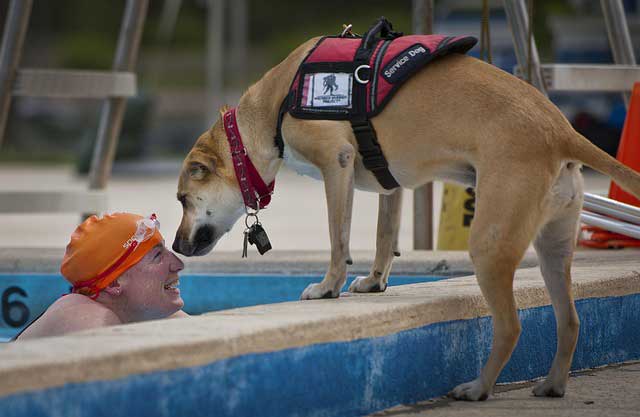Service Animal Laws-A Basic Guide
 When you have a service animal, you need to know about service animal laws. Laws will vary depending on the state that you are in, however, there are federal laws that apply regardless of where you live. It is important that you know what the federal law is and how it will affect your service animal.
When you have a service animal, you need to know about service animal laws. Laws will vary depending on the state that you are in, however, there are federal laws that apply regardless of where you live. It is important that you know what the federal law is and how it will affect your service animal.
Service Animal Laws
When the US Department of Justice revised the regulation on service animals in the American’s with Disabilities Act, they updated the definition of service animals. In federal law, service animals are defined as dogs that have been individually trained to perform tasks or work for people who have disabilities. The task or work that the dog has been trained to complete must be directly related to the disability that the person has.
It is important to note that this definition of a service animal is different than for an Emotional Support Animal the laws used for Emotional support Animals are the Air Carrier Access Act or the Fair Housing Act. There are also some states which use a broader definition of what a service animal is than the ADA. These broader definitions often call the service animals assistance animals.
Where Service Animals Are Allowed
According to the American’s with Disabilities Act, service animals are allowed to enter any business, local government and non-profit organization which services the general public. These animals should be allowed to accompany any people with disabilities in all areas where the public is normally allowed to go. An example of this will be a hospital where the service animal should be allowed to enter the patient rooms, examination rooms and clinics.
It is important to note that there are areas where service animals can legally be excluded. In the case of a hospital, these  exclusion areas will include operating rooms and burn units. These areas are excluded because they could be compromised by the presence of the service animal.
exclusion areas will include operating rooms and burn units. These areas are excluded because they could be compromised by the presence of the service animal.
Service Animals Must Be Under Control
Under federal law, all service animals will need to be kept on a leash, harnessed or tethered. The only times when this is not applicable will be when the control devices interfere with the work the animal has to complete or the owner’s disability prevents the use of these devices. If these devices cannot be used for any reason, the owner of the service animal will need to be able to control the animal through signals and voice controls.
The Provision For Miniature Horses
In addition to service dogs, the revision of the ADA regulations has a new provision for miniature horses. These provisions relate to any miniature horse which has been individually trained to perform tasks and work for people with disabilities. To be classified as a miniature horse, the horse will need to measure 24 to 34 inches from the ground to shoulders. The horse will also need to have a general weight of 70 to 100 pounds. The ADA states that these service animals will need to be permitted where reasonable.

Click the button below
Have Questions? Most People Do!
Call us with any Questions 760-485-6784

Click the button below